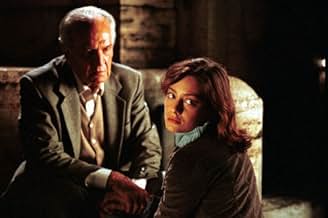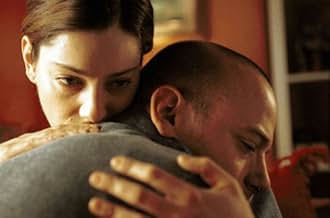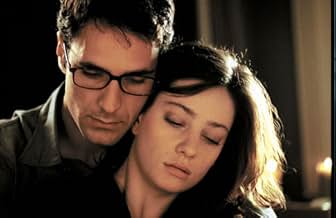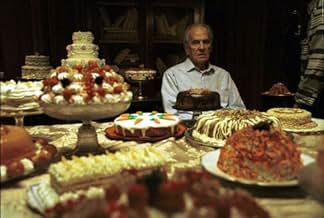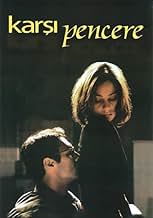AVALIAÇÃO DA IMDb
7,2/10
12 mil
SUA AVALIAÇÃO

Reproduzir clip2:59
Assistir a Facing Windows Scene: I Don't Taste Things As Good As I Once Did
Adicionar um enredo no seu idiomaOverburdened and stuck in a greying marriage, Giovanna takes to caring for the Jewish Holocaust survivor her husband brings home. As she begins to reflect on her life, she turns to the man w... Ler tudoOverburdened and stuck in a greying marriage, Giovanna takes to caring for the Jewish Holocaust survivor her husband brings home. As she begins to reflect on her life, she turns to the man who lives across from her ...Overburdened and stuck in a greying marriage, Giovanna takes to caring for the Jewish Holocaust survivor her husband brings home. As she begins to reflect on her life, she turns to the man who lives across from her ...
- Direção
- Roteiristas
- Artistas
- Prêmios
- 34 vitórias e 24 indicações no total
Antonella Antinori
- Tintora
- (as Veronica Bruni)
Ohame-Brancy Chibuzo
- Alessio
- (as Ohame Brancy Chibuzo)
- Direção
- Roteiristas
- Elenco e equipe completos
- Produção, bilheteria e muito mais no IMDbPro
Avaliações em destaque
I very much appreciated Ozpetek's previous film, "Le fate ignoranti", which has earned him a lot of respect on the part of both audiences and critics, in Italy and beyond. I was reluctant to go see this film because of the casting of Raoul Bova (a second-rate actor who doesn't have much substance behind his good looks and began his career as a teenage heartthrob - what a pity it didn't end there) and because of the reference to the Nazi deportation of Roman Jews, which took place on October 16th, 1943 - I just felt that to use this as a pretext for a gay love story was kind of cheap. But nearly everyone I knew who had gone see the film kept me telling that it was good, so I became so curious that I decided to go. Well, my friends were absolutely right.
Ozpetek's strength is his ability to portray characters that are realistic without being obvious, so everyone can relate to them without identifying with them. He showed that already good ability in "Le fate ignoranti" as well, but this time he seems to have developed it even further. His approach is always personal, and this enables him to make films that are deeply introspective. It is the kind of films that the French are usually good at making, but Ozpetek in not an imitator. What makes his films so DIFFERENT is that there seems an emotional involvement that is very difficult to find elsewhere; at the same time, this never translates into trite sentimentalism or dull rhetoric.
This is an outstanding film, and this is so also thanks to the performances given by most of the actors. Massimo Girotti, in his last appearance before his death, shows that, at about 80 years of age, he was still able to be a first-class actor (and this explains why he featured in so many films by Visconti); after this film, which is dedicated to him, we will all miss him even more than we already did. Giovanna Mezzogiorno, the daughter of a late actor herself, also gives an outstanding performance as the woman who finds herself at the crossroads and is torn between passion and the responsibilities of everyday life, between reality and desire, just like so many of us often are. Filippo Nigro, who also featured in a minor role in "Le fate ignoranti", is given a more important role in this film, and deservedly so. The only exception is Raoul Bova, and I wonder why Ozpetek seems to have a compelling need to cast "actors" who are more sort of toy boys, mostly in secondary roles (Bova in this case, Gabriel Garko in "Le fate ignoranti"), who usually have very limited acting abilities and who almost inevitably end up faring very poorly and suffering from the comparison that is inevitably drawn between their performances and those of the other actors who feature in the films; which is even more striking if we take into account the fact that Ozpetek seems to have the ability to rejuvenate actors and to make them play characters that are very different from their clichés (as an example, consider not only Massimo Girotti in this case, but also Margherita Buy in "le fate ignoranti").
Just one word for the soundtrack, which made the film even more touching and has spawned a major Italian chart hit.
The only criticism that can be made? How come that Italian directors seem to have lost the ability to say something about the society in which they live? In the past, they were able to be sardonic about it, and to intertwine the two levels, social and personal. Now the only films they seem able to make are personal-only stories, and that's a pity.
Altogether, a deeply recommended film.
Ozpetek's strength is his ability to portray characters that are realistic without being obvious, so everyone can relate to them without identifying with them. He showed that already good ability in "Le fate ignoranti" as well, but this time he seems to have developed it even further. His approach is always personal, and this enables him to make films that are deeply introspective. It is the kind of films that the French are usually good at making, but Ozpetek in not an imitator. What makes his films so DIFFERENT is that there seems an emotional involvement that is very difficult to find elsewhere; at the same time, this never translates into trite sentimentalism or dull rhetoric.
This is an outstanding film, and this is so also thanks to the performances given by most of the actors. Massimo Girotti, in his last appearance before his death, shows that, at about 80 years of age, he was still able to be a first-class actor (and this explains why he featured in so many films by Visconti); after this film, which is dedicated to him, we will all miss him even more than we already did. Giovanna Mezzogiorno, the daughter of a late actor herself, also gives an outstanding performance as the woman who finds herself at the crossroads and is torn between passion and the responsibilities of everyday life, between reality and desire, just like so many of us often are. Filippo Nigro, who also featured in a minor role in "Le fate ignoranti", is given a more important role in this film, and deservedly so. The only exception is Raoul Bova, and I wonder why Ozpetek seems to have a compelling need to cast "actors" who are more sort of toy boys, mostly in secondary roles (Bova in this case, Gabriel Garko in "Le fate ignoranti"), who usually have very limited acting abilities and who almost inevitably end up faring very poorly and suffering from the comparison that is inevitably drawn between their performances and those of the other actors who feature in the films; which is even more striking if we take into account the fact that Ozpetek seems to have the ability to rejuvenate actors and to make them play characters that are very different from their clichés (as an example, consider not only Massimo Girotti in this case, but also Margherita Buy in "le fate ignoranti").
Just one word for the soundtrack, which made the film even more touching and has spawned a major Italian chart hit.
The only criticism that can be made? How come that Italian directors seem to have lost the ability to say something about the society in which they live? In the past, they were able to be sardonic about it, and to intertwine the two levels, social and personal. Now the only films they seem able to make are personal-only stories, and that's a pity.
Altogether, a deeply recommended film.
"Facing Windows (La Finestra di fronte)" is like a very European and more sophisticated take on "The Notebook," as it shifts between romantic and culinary past and present through the in-and-out consciousness of an elderly man.
The "Rear Window" eroticism is just one element that accidentally brings together tangled, stymied lives swirling around lovely, exhausted, frustrated chef, wife and mother Giovanna Mezzogiorno, where each child, man, woman, friend and neighbor has separate priorities and fantasies that annoying real life interferes with, from the practical to the political.
Each character and their ties are both delightfully and surprisingly complex and the actors are so comfortable bringing each to complete life that you think you too should be able to come out of the theater speaking Italian so naturally.
But this is a frank, gritty, contemporary, urban Italy we don't usually get to see, with multi-racial immigrants, underemployment and a Fascist past.
The sentimentalism of the live with no regrets lesson is leavened by the seriousness of the final revelations and the compromises that each character still makes.
The music selections nicely fit each character.
The "Rear Window" eroticism is just one element that accidentally brings together tangled, stymied lives swirling around lovely, exhausted, frustrated chef, wife and mother Giovanna Mezzogiorno, where each child, man, woman, friend and neighbor has separate priorities and fantasies that annoying real life interferes with, from the practical to the political.
Each character and their ties are both delightfully and surprisingly complex and the actors are so comfortable bringing each to complete life that you think you too should be able to come out of the theater speaking Italian so naturally.
But this is a frank, gritty, contemporary, urban Italy we don't usually get to see, with multi-racial immigrants, underemployment and a Fascist past.
The sentimentalism of the live with no regrets lesson is leavened by the seriousness of the final revelations and the compromises that each character still makes.
The music selections nicely fit each character.
What a rich and satisfying film this is! The complexity of lives interweaving, with a transformative impact is a rare experience in this medium.
Life is full of chance meetings...often ignored...but in this film it is pivotal. A young couple, having serious relational problems, come upon a dazed old man on the street. His entrance in their lives, his own dramatic life and the wife's (Giovanna's) ultimate connection to him serves as a link to her profound choices...First, to risk a sexual encounter with the handsome neighbor she's watched through her facing windows and second, to recognize that her discontent has been with herself, more than her loving husband. The complexity of the old man's life...his survival of a concentration camp...giving up a beloved lover to save others...his success as a famous pastry chef...all contribute in a tangential way to Giovanna's transformation. The final scene is enormously moving and meaningful.
Don't miss this gem...if humanism, great performances and cinematic richness are important to you.
Life is full of chance meetings...often ignored...but in this film it is pivotal. A young couple, having serious relational problems, come upon a dazed old man on the street. His entrance in their lives, his own dramatic life and the wife's (Giovanna's) ultimate connection to him serves as a link to her profound choices...First, to risk a sexual encounter with the handsome neighbor she's watched through her facing windows and second, to recognize that her discontent has been with herself, more than her loving husband. The complexity of the old man's life...his survival of a concentration camp...giving up a beloved lover to save others...his success as a famous pastry chef...all contribute in a tangential way to Giovanna's transformation. The final scene is enormously moving and meaningful.
Don't miss this gem...if humanism, great performances and cinematic richness are important to you.
An Italian movie that starts as a pleasant but otherwise unremarkable tale of a nine year old marriage and an old man wandering the streets with no memory and a pocketful of money. We are drawn in by the rather lovable (if all too human and imperfect) characters until, half way through, the film explodes with moments of real beauty, passion and tenderness. The cinematography deftly weaves flashbacks and fleeting glances from within the minds of the main characters, their memories merging seamlessly for a few moments with the real life around them. The script contains gems that you want to remember.
Italian star Giovanna Mezzogiorno is superb as the wife who seems to be locked in a constant struggle with her husband and attracted to the man in the apartment facing theirs. But Facing Window proves to be far more than melodrama triangle: echoes of the Nazi holocaust and the inner strength to realize one's true feelings, as well as one's true calling ... 'it isn't enough to dream about a better life, you must demand it.' For those who like something more substantial to their cinema than popcorn and nachos, Facing Window fits the bill with effortless grace.
Italian star Giovanna Mezzogiorno is superb as the wife who seems to be locked in a constant struggle with her husband and attracted to the man in the apartment facing theirs. But Facing Window proves to be far more than melodrama triangle: echoes of the Nazi holocaust and the inner strength to realize one's true feelings, as well as one's true calling ... 'it isn't enough to dream about a better life, you must demand it.' For those who like something more substantial to their cinema than popcorn and nachos, Facing Window fits the bill with effortless grace.
Sadly, this type of film is all too rare.
Without the relying on clichéd plot-devices, it achieves a striking level of dramatic intensity through character and relationship development. You care what happens to them as if you knew them personally and thats why it works.
As soon as the credits began to roll, I immediately wanted to watch the film all over again. It left me with so many questions and thoughts, about my own life- a cinematic version of Coelho's Alchemist?
For me, the recurring theme in the film, is choices- life choices- forks in the road- and the consequences our decisions yield.
1. Davide stalling on the cobbled stoned streets- torn between his lover and his town. 2. Giovanna and Filippo on the bridge, arguing whether they should get involved with the strange old man. 3. Giovanna and the two men in her life. 4. Giovanna at window in Lorenzos house having a crisis of conscience. 5. Lorenzo taking up the work opportunity, instead of staying in Rome. 6. Giovanna changing careers. 7. Giovanna running down the steps at the end- mirroring the opening scene of the film, she becomes Davide's character in that she makes the ultimate sacrifice for her family. Although we are never told it directly, we realize afterwards that Davide has died- In the way that Giovanna talks about him; saying she misses him now he's gone. "Does everyone that leaves you, leave something of themselves behind". Giovanna says that she hears him in HER voice, and feels him in her gestures. The symmetry of this film is what makes it so beautiful and complete.
The message? Follow your passion, follow your heart and you will have no regrets Something that really made me think was the line Davide said to Giovanna- " You have turned your passion into a hobby. You should never do that with a talent" So finally Giovanna finds her true love- her liberation from a life she no longer loves.
Another element that adds to the realism is the dialogue- From the electrifying opening argument between the two lovers, to the smart quips of the brainy daughter, every character is given a chance to shine. Such a relief from the typical Hollywood crap we are forced to endure.
Everything about this films, seems to linger long after you leave the cinema. The visual beauty, the score, Giovanna's beautiful eyes, the scenery- a true delight of a film that I love recommending to friends.
Without the relying on clichéd plot-devices, it achieves a striking level of dramatic intensity through character and relationship development. You care what happens to them as if you knew them personally and thats why it works.
As soon as the credits began to roll, I immediately wanted to watch the film all over again. It left me with so many questions and thoughts, about my own life- a cinematic version of Coelho's Alchemist?
For me, the recurring theme in the film, is choices- life choices- forks in the road- and the consequences our decisions yield.
1. Davide stalling on the cobbled stoned streets- torn between his lover and his town. 2. Giovanna and Filippo on the bridge, arguing whether they should get involved with the strange old man. 3. Giovanna and the two men in her life. 4. Giovanna at window in Lorenzos house having a crisis of conscience. 5. Lorenzo taking up the work opportunity, instead of staying in Rome. 6. Giovanna changing careers. 7. Giovanna running down the steps at the end- mirroring the opening scene of the film, she becomes Davide's character in that she makes the ultimate sacrifice for her family. Although we are never told it directly, we realize afterwards that Davide has died- In the way that Giovanna talks about him; saying she misses him now he's gone. "Does everyone that leaves you, leave something of themselves behind". Giovanna says that she hears him in HER voice, and feels him in her gestures. The symmetry of this film is what makes it so beautiful and complete.
The message? Follow your passion, follow your heart and you will have no regrets Something that really made me think was the line Davide said to Giovanna- " You have turned your passion into a hobby. You should never do that with a talent" So finally Giovanna finds her true love- her liberation from a life she no longer loves.
Another element that adds to the realism is the dialogue- From the electrifying opening argument between the two lovers, to the smart quips of the brainy daughter, every character is given a chance to shine. Such a relief from the typical Hollywood crap we are forced to endure.
Everything about this films, seems to linger long after you leave the cinema. The visual beauty, the score, Giovanna's beautiful eyes, the scenery- a true delight of a film that I love recommending to friends.
Você sabia?
- CuriosidadesMassimo Girotti died on 6 January 2003 and the movie is dedicated to his memory. Before he was cast, Ferzan Özpetek had considered also Jean Rochefort and Serge Reggiani for his role.
- Trilhas sonorasLa Finestra di fronte
Written by Andrea Guerra
Principais escolhas
Faça login para avaliar e ver a lista de recomendações personalizadas
- How long is Facing Windows?Fornecido pela Alexa
Detalhes
- Data de lançamento
- Países de origem
- Centrais de atendimento oficiais
- Idioma
- Também conhecido como
- Facing Windows
- Locações de filme
- Ponte Sisto, Roma, Lazio, Itália(where Giovanna and Filippo meet Simone)
- Empresas de produção
- Consulte mais créditos da empresa na IMDbPro
Bilheteria
- Faturamento bruto nos EUA e Canadá
- US$ 543.354
- Fim de semana de estreia nos EUA e Canadá
- US$ 36.061
- 20 de jun. de 2004
- Faturamento bruto mundial
- US$ 15.535.312
- Tempo de duração
- 1 h 46 min(106 min)
- Cor
- Mixagem de som
- Proporção
- 2.35 : 1
Contribua para esta página
Sugerir uma alteração ou adicionar conteúdo ausente





